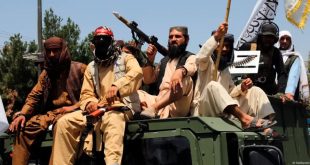By Shakti Sinha-The long-awaited visit of President Ashraf Ghani of Afghanistan was particularly unusual in that the expectations were low, the opposite of what we would normally expect. The Indian strategic community was generally upset with Ghani’s perceived tilt towards Pakistan and China. And I suspect, the leadership in the foreign ministry had to face an unusual situation of having to deal with an Afghan leader who was apparently not on board with India in identifying Pakistan as the epicentre of terrorism in the region; terrorism for which the Afghan people and society are paying a heavy price even at present.
The expectations of any bilateral visit have changed over the years and their success, or failure, is measured in terms of agreements/memorandum of understanding/protocols signed. So how should one assess this visit? And more important, what is the way forward for India.
Prime Minister Modi in the joint press conference made it quite clear that the India-Afghanistan relations are not transactional, and that India shares the dreams of the Afghan people for peace and stability, in fact he said that “India stands shoulder-to-shoulder with the Afghan people, supports an Afghan-led and Afghan-owned peace process”. Modi added that India ‘shared Afghanistan’s pain over persisting terrorism and extremist violence that destroyed lives and derailed progress.’ President Ghani, on his part, interestingly said that the bilateral relations between Afghanistan and India were unique in that the past did not stand in the way of such relationship. And both leaders in the joint communiqué ‘reaffirmed their commitment to patiently and systematically work towards strengthening of the India Afghanistan Strategic partnership, with a clear focus on the long term relationship between them.’
While the overall optics looks fine, many Indian strategists do feel a sense of disappointment. Unlike the previous communiqué of 2013 issued during the last bilateral visit of President Karzai, this time around there was no mention of Indian assistance in defence and security sectors.
Though the Indian government used the visit to hand over three Cheetal helicopters, the fact is that Ghani confirmed that while he has not withdrawn his predecessor’s wish list of defence equipment, he is not acting on it either. When asked at the press conference about Pakistan becoming the country of choice for defence assistance, Ghani was quick to point out that while there are only 8 Afghan defence personnel being trained in Pakistan, the numbers being trained in India was 600. However, his repeated references to not allowing Afghanistan to be a site for proxy wars did not go well with his Indian audiences. A significant section of the Afghan elite seem to have bought the Pakistani disinformation that India and Pakistan are fighting a proxy war in Afghanistan.
While there is no doubt that during the Taliban period, Pakistan ran training camps in Khost province of Afghanistan for terrorists to be deployed in Kashmir, and the ISI has used the Lashkar-e-Taiba (LeT), the Haqqani network and the Hizb ut-Tahrir to target Indians and Indian assets in Afghanistan, the reverse is not true.
Though India operates 4 consulates in Afghanistan, two in Herat and Mazar-i-Sharif are very far from the Afghanistan-Pakistan border. Yet Pakistan insists that all Indian consulates are concentrated near the borders. And the other two are in Jalalabad and Kandahar, admittedly the two most important cities in the East and the South. Musharraf went to the extent of saying that India has 25 consulates in Afghanistan. And despite repeated allegations of Indian involvement in Balochistan, using consulates in Afghanistan, Pakistan is yet to offer any proof.
On his India visit, President Ghani’s entire focus was thus on the economic integration of the South Asian region, of Afghanistan being the hub connecting this region with Central Asia and West Asia. He gave the historic example of the Indo-Afghan ruler Sher Shah Suri and the economic integration engendered by the construction of the Grand Trunk Road. In that vein, he talked about pipelines, railroads, fibre optic cables and highways linking the region. In the specific context of Chabahar port, he said that Afghanistan would set up a special economic zone on the Iranian border which would provide easy link with the port. And that he had directed that the route of the proposed Turkmenistan-Afghanistan-Pakistan-India (TAPI) bypass the troubled Helmand and neighbouring provinces.
President Ghani as a serious scholar of state stability and based on his extensive experience at the World Bank and stint as his country’s finance minister is absolutely right to focus on the economic aspects of bilateral relations and regional architecture. And India, particularly with the present government’s rightful focus on economic growth, trade and regional/supra-regional integration, should cooperate with the Afghan authorities in pushing this agenda.
Ghani’ turning to China to help bring peace to his country, by pushing Pakistan in this direction, can be considered a beneficial starting point. China appears keen to change the dominant narrative in Pakistan by launching the US$ 46 billion China Pakistan Economic Corridor. Contrary to most Pakistani analysts, Chinese funding would be strictly as a commercial investment, with attractive guaranteed returns. These investments would not take place, or yield returns, unless there is peace and stability in Pakistan. More so, a dangerously unstable Afghanistan would affect stability in Pakistan and jeopardise CPEC completely. The Pakistani army and its proxies are responsible for the insurgency, terrorism and insecurity in Afghanistan. Therefore, the Pakistani army has to be reined in, and its ‘terror’ assets (LeT, Hizb ut-Tahrir, Haqqani network, etc) liquidated, otherwise there would be no peace in Afghanistan, and in Pakistan.
Specifically on regional economic integration and on Afghanistan once again becoming the hub linking three regions and beyond, the lowest picking fruit would be to link India and Afghanistan by road.
Afghanistan is a land-locked country with Pakistan being its single most important ‘door’ to the world. The existing Afghanistan Pakistan Transit Agreement allows Afghan trucks to bring Afghan goods through Pakistani territory to Wagah, but does not allow these trucks to carry any Indian goods back to Pakistan. Recently, the Indian Embassy in Kabul made a demarche to the Afghan government that since the treaty is being revised, India should be made a party to it.
It is time, India raise this issue with President Ghani and his government, since direct transport links are the essential building blocks for regional integration. Pending that, Afghan trucks should be allowed to carry Indian goods from Wagah to Afghanistan, as they are doing on the Karachi-Afghanistan route. This would make Afghan logistic companies competitive, and lead to increased trading volumes.
If this simple request, which is neither a favour nor unusual, would give India the assurance that Pakistan is a trusted partner in economic relations and would provide a conducive atmosphere for India’s participation in the TAPI project. Insecurity in southern Afghanistan may pose a threat to the project as a whole, but it is unlikely that India would support TAPI until it sees Pakistan as a responsible partner. Without India, TAP is not a viable project.
The Modi government has very wisely decided to invest US$ 86 million in upgrading Chabahar project, as a way to lessen Afghanistan’s dependence on Karachi, and to provide India an access to Central Asia. India and Afghanistan should work with Iran to make Chabahar and its catchment area an economic hub through improved security, supporting infrastructure and a web of commercial ecosystem necessary to attract investment. Similarly, India should devise innovative instruments to encourage the Indian private sector to become a participant in Afghanistan’s economic growth story.
India-Afghanistan relations are long term and there would be political setbacks, but if economic underpinnings are strong then obstacles created by unfriendly neighbours can be considerably stymied. India must show leadership, and generosity, so that countries in the region can become its close economic partners, benefitting from its growth, and providing the former with peace and stability in its neighbourhood.—(Organiser)
The writer is a former civil servant who has worked in Afghanistan for the UN for three years.
 Afghanistan Times
Afghanistan Times




